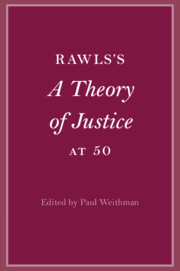Book contents
- Rawls’s A Theory of Justice at 50
- Cambridge Philosophical Anniversaries
- Rawls’s A Theory of Justice at 50
- Copyright page
- Dedication
- Contents
- Figures
- Contributors
- Acknowledgments
- Abbreviations of and Bibliographic Information for Rawls’s Works
- Introduction
- Part I Rawls and History
- Part II Developments between A Theory of Justice and Political Liberalism
- 6 On Being a “Self-Originating Source of Valid Claims”
- 7 Moral Independence Revisited
- 8 The Method of Insulation
- 9 The Stability or Fragility of Justice
- Part III Rawls, Ideal Theory, and the Persistence of Injustice
- Part IV Pluralism, Democracy, and the Future of Justice as Fairness
- References
- Index
9 - The Stability or Fragility of Justice
from Part II - Developments between A Theory of Justice and Political Liberalism
Published online by Cambridge University Press: 20 July 2023
- Rawls’s A Theory of Justice at 50
- Cambridge Philosophical Anniversaries
- Rawls’s A Theory of Justice at 50
- Copyright page
- Dedication
- Contents
- Figures
- Contributors
- Acknowledgments
- Abbreviations of and Bibliographic Information for Rawls’s Works
- Introduction
- Part I Rawls and History
- Part II Developments between A Theory of Justice and Political Liberalism
- 6 On Being a “Self-Originating Source of Valid Claims”
- 7 Moral Independence Revisited
- 8 The Method of Insulation
- 9 The Stability or Fragility of Justice
- Part III Rawls, Ideal Theory, and the Persistence of Injustice
- Part IV Pluralism, Democracy, and the Future of Justice as Fairness
- References
- Index
Summary
Rawls assesses conceptions of justice in terms of how stable a society governed by them would be. I describe how Rawls presents this view of stability differently in A Theory of Justice and Political Liberalism. I then argue that G.A. Cohen’s objections to this view largely fail insofar as we grant Rawls the claim that the task of principles of justice is to provide fair terms of cooperation. But I then develop an objection to this claim by drawing on Cohen’s critique of Rawls’s treatment of the circumstances of justice. These circumstances are more capacious than Rawls allows. Nonetheless, contra Cohen, we can retain one of the key insights of Rawls’s project, which is that justice is fundamentally about realizing a certain kind of relationship rather than realizing a particular distribution of goods. I sketch a Kantian conception of the relevant relationship and consider the role stability plays in it.
Keywords
- Type
- Chapter
- Information
- Rawls’s A Theory of Justice at 50 , pp. 151 - 166Publisher: Cambridge University PressPrint publication year: 2023
- 1
- Cited by

